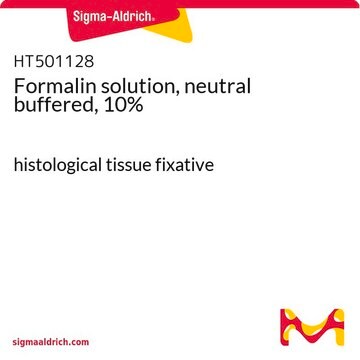P6148
Paraformaldehyde
reagent grade, crystalline
Synonym(s):
Polyoxymethylene
About This Item
Recommended Products
grade
reagent grade
Quality Level
vapor density
1.03 (vs air)
vapor pressure
<1.45 mmHg ( 25 °C)
form
crystalline
autoignition temp.
572 °F
expl. lim.
73 %
mp
120-170 °C (lit.)
density
0.88 g/mL at 25 °C (lit.)
storage temp.
2-8°C
InChI
1S/CH2O/c1-2/h1H2
InChI key
WSFSSNUMVMOOMR-UHFFFAOYSA-N
Looking for similar products? Visit Product Comparison Guide
General description
Application
Paraformaldehyde has been used for fixing of cells and tissue sections during staining procedures.
related product
Signal Word
Danger
Hazard Statements
Precautionary Statements
Hazard Classifications
Acute Tox. 4 Inhalation - Acute Tox. 4 Oral - Carc. 1B - Eye Dam. 1 - Flam. Sol. 2 - Muta. 2 - Skin Irrit. 2 - Skin Sens. 1 - STOT SE 3
Target Organs
Respiratory system
Storage Class Code
4.1B - Flammable solid hazardous materials
WGK
WGK 2
Flash Point(F)
Not applicable
Flash Point(C)
Not applicable
Personal Protective Equipment
Choose from one of the most recent versions:
Already Own This Product?
Find documentation for the products that you have recently purchased in the Document Library.
Customers Also Viewed
Articles
Available Fluorescent in situ hybridization (FISH) procedures, reagents and equipment.
Protocols
Cell staining can be divided into four steps: cell preparation, fixation, application of antibody, and evaluation.
Related Content
Three-dimensional (3D) printing of biological tissue is rapidly becoming an integral part of tissue engineering.
Our team of scientists has experience in all areas of research including Life Science, Material Science, Chemical Synthesis, Chromatography, Analytical and many others.
Contact Technical Service











